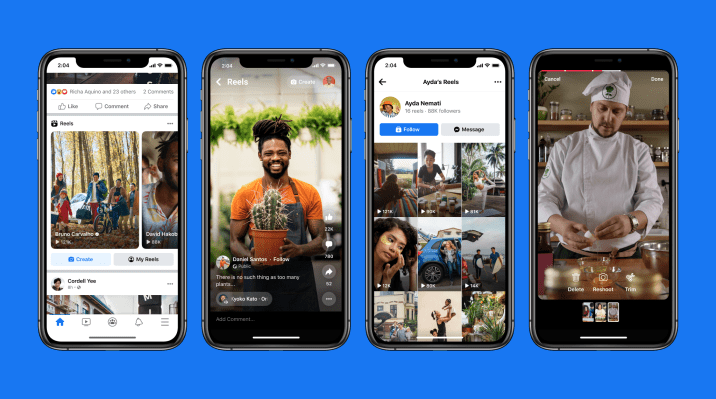Meta recently said it would prioritize original content in its algorithms. Now, it’s going to pay for it.
To help fend off the TikTok threat, Meta announced this week it now dole additional bonuses to Reels creators who are publishing original content on Facebook. The company warned that this change to payouts could see some creators losing money, while others gain, when compared with their prior performance. It’s also introducing a new incentive called “Challenges” that enable Facebook Reels creators to earn up to $4,000 per month for meeting certain goals.
Not to be confused with hashtag challenges — where a company asks its creator community to post about a certain topic — Facebook’s Challenges are a way to progress through a series of bonuses to reach a maximum payout.
Each month, creators will be able to participate in a set of sequential, cumulative challenges which build upon one other. For example, the creator might first earn $20 when at least 5 of their Reels reach 100 plays each. After they accomplish that goal, another would be unlocked — like earning $100 when 20 Reels reach 500 plays each. This progress would continue throughout the 30-day period, then reset at the beginning of the next month to start a new set of challenges.
Only select creators have been invited into the Reels Bonus program at this time, notes Facebook. But the company says it’s planning to test various incentive programs and adjust payout pricing as it learns more. It also notes it’s begun rolling out overlay ads in Reels on Facebook where they’re testing with a wider set of creators and will expand to more over time.
“Over 45% of Instagram accounts like, comment on, or share Reels at least once a week,” said Meta COO Sheryl Sandberg, speaking to an audience of media buyers during the company’s NewFronts presentation earlier this week. “Creators of all types are leaning into Reels and using it as a way to engage new audiences and connect with their fans. And we’re supporting them with tools to monetize, both through ad revenue share bonus programs and support from fans,” she said.
Meta also announced its virtual tipping system, Stars, has expanded tests on Facebook and soon, Instagram creators will be able to crosspost their Reels to Facebook — a feature it’s been testing since last fall. As part of this expansion, Meta will test allowing creators to earn an ad revenue share on their crossposted Reels via Overlay ads, as well.
Currently, Meta is monetizing Overlay ads with a revenue share of 55% to the creator and 45% to Facebook. That’s a bit higher than the 50/50 share that TikTok just announced this week with the launch of its TikTok Pulse program. Although Pulse is different type of ad product, it’s the first and only ad rev share for TikTok creators at present. But since Facebook ads still tend to be more expensive than TikTok’s, it’s hard to say yet which rev share would be more beneficial to a creator’s bottom line.
Perhaps the bigger news coming out this week is that Facebook is taking a step to make earning bonuses less of a black box.
Last year, creators were earning outsized rewards — even as much as $10,000 or more — but the numbers have since come down, some creators have said. The FT reported creators found the number of views it was taking to meet a bonus target had increased, which made it harder to achieve their threshold. But because Meta’s system is dynamic and personalized, it’s can be difficult to really understand what Meta’s targets are.
On that front, Meta will now at least introduce a way for individual creators to track their bonuses in one place to see how well they’re doing.
Meta says it’s introducing a Reels Play Bonus Insight page on Facebook, where they’ll be able to see how many plays each of their eligible Reels received within a given earning period.
The changes to the Bonus program follow another recent move by the company to change its algorithms to prioritize original content over reposts or other aggregated content from other sources. Meta had already said that it didn’t want TikTok reposts, having said earlier that content that included a watermark from another site would be downranked.
As Meta moves to monetize more of its Reels with ads, the company took to the NewFronts this week to promote its progress in challenging TikTok. Here, the company repeated some metrics related to video’s traction, noting that 50% of the time spent on Meta’s platforms now involves video; over 2 billion people watch videos with in-stream ads; and more than 700 million people are using AR effects each month.
“Reels, our newest video format, is now the biggest engagement growth driver on Instagram,” touted Nada Stirratt, Meta VP, Americas,” during the company’s NewFronts presentation.”Our suite of video solutions is used by both creators and publishers to tell immersive stories to audiences at scale,” she said.
